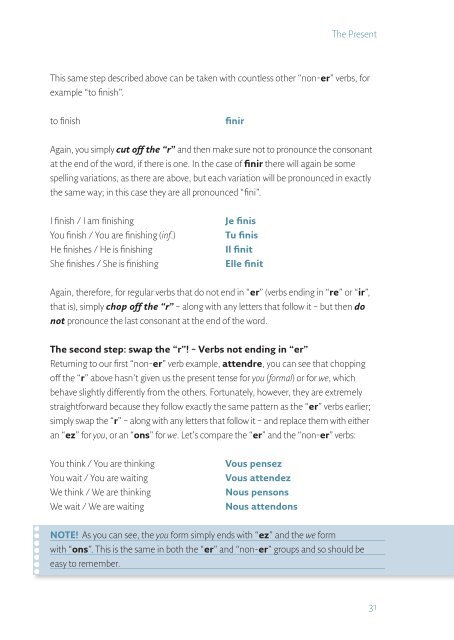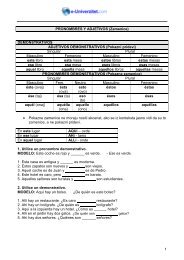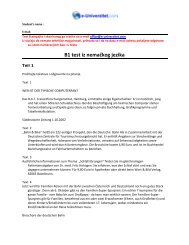Collins Paul Noble French booklet.pdf - Centar za edukaciju i ...
Collins Paul Noble French booklet.pdf - Centar za edukaciju i ...
Collins Paul Noble French booklet.pdf - Centar za edukaciju i ...
You also want an ePaper? Increase the reach of your titles
YUMPU automatically turns print PDFs into web optimized ePapers that Google loves.
The Present<br />
This same step described above can be taken with countless other “non-er” verbs, for<br />
example “to fi nish”.<br />
to fi nish fi nir<br />
Again, you simply cut off the “r” and then make sure not to pronounce the consonant<br />
at the end of the word, if there is one. In the case of fi nir there will again be some<br />
spelling variations, as there are above, but each variation will be pronounced in exactly<br />
the same way; in this case they are all pronounced “fi ni”.<br />
I fi nish / I am fi nishing Je fi nis<br />
You fi nish / You are fi nishing (inf.) Tu fi nis<br />
He fi nishes / He is fi nishing Il fi nit<br />
She fi nishes / She is fi nishing Elle fi nit<br />
Again, therefore, for regular verbs that do not end in “er” (verbs ending in “re” or “ir”,<br />
that is), simply chop off the “r” – along with any letters that follow it – but then do<br />
not pronounce the last consonant at the end of the word.<br />
The second step: swap the “r”! – Verbs not ending in “er”<br />
Returning to our fi rst “non-er” verb example, attendre, you can see that chopping<br />
off the “r” above hasn’t given us the present tense for you (formal) or for we, which<br />
behave slightly differently from the others. Fortunately, however, they are extremely<br />
straightforward because they follow exactly the same pattern as the “er” verbs earlier;<br />
simply swap the “r” – along with any letters that follow it – and replace them with either<br />
an “ez” for you, or an “ons” for we. Let’s compare the “er” and the “non-er” verbs:<br />
You think / You are thinking Vous pensez<br />
You wait / You are waiting Vous attendez<br />
We think / We are thinking Nous pensons<br />
We wait / We are waiting Nous attendons<br />
NOTE! As you can see, the you form simply ends with “ez” and the we form<br />
with “ons”. This is the same in both the “er” and “non-er” groups and so should be<br />
easy to remember.<br />
31









